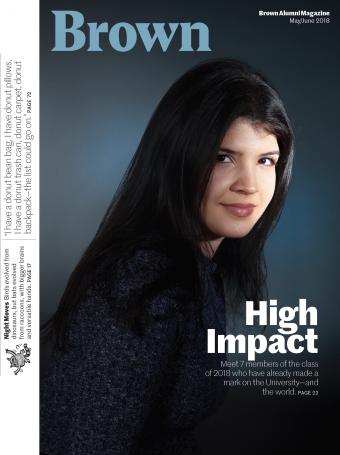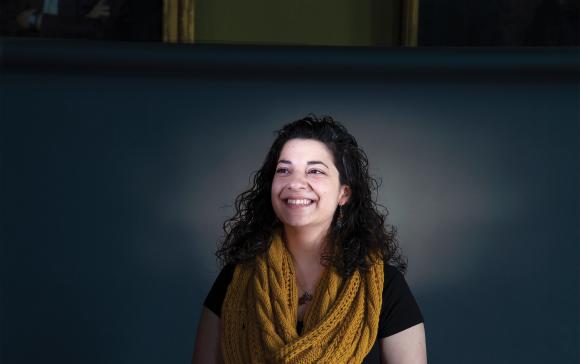PROVIDENCE, R.I. [Brown University] — Before arriving at Brown, Anne Prusky, a native English speaker from the Philadelphia suburbs, had mastered Hebrew and Latin. So she wanted to study another language. She chose American Sign Language (ASL), not because anyone in her family is deaf (“I had never met a deaf person before Brown,” she says) but because she thought it would be “way easier” than learning a spoken language. “I was super wrong,” she says, laughing. At the time she had no idea that ASL would end up being the focal point of her college career.
“I loved who it turned me into,” she later wrote. “When talking with my hands I was suddenly more expressive, braver, even funnier.” Prusky sought out new people to sign with, and in Fall 2015 she founded the Brown University Sign Language Society, which hosts variety shows that include poetry, storytelling and improv games involving the local deaf community.

As a first-year, Prusky took Introduction to Linguistic Anthropology and fell in love. “It was amazing,” she says. She soon learned, however, that not enough courses existed for a concentration, so she designed her own, Socio-Cultural Linguistics (SCL), based on the languages she knew — English, Hebrew, and ASL — and their distinctive cultures.
Though she aligned herself with the linguistics department, she sought a broader perspective, wanting to study not just the technical systems present in language, but also “the real-life effects of language on society and society on language.” She was primarily interested in a multidisciplinary approach — delving not only into linguistics but into anthropology, sociology, psychology, Judaic Studies and history as well. “In short,” she wrote in her proposal, “SCL is a way of understanding the human world through our most defining characteristic — the use of language.”
As part of the Engaged Scholars Program, which combines academic studies with “community-based, experiential learning,” Prusky worked in three different deaf communities. As an intern for the Rhode Island Commission on the Deaf and Hard of Hearing, she helped coordinate data on deaf students in Rhode Island schools. While working with the DeafYES! research team at UMass Medical School, whose goal is to make research studies more accessible to deaf people, she was in a “fully signing environment” where her “sign-language skills jumped four feet.” She’s also been working for the Governor Henry Lippitt House in Providence as an accessibility intern, helping to make the museum more welcoming to the deaf. She recently won a $2,000 grant to purchase new equipment and create an ASL museum tour.
After graduation, Prusky plans to pursue what she’s wanted to do since middle school: teach. She’s not sure yet if that will be at a Jewish or secular school or working with the deaf. But one thing she does know: “I hope to be engaged socially and politically with deaf folks forever.”
— Leslie Weeden, Contributing Editor


